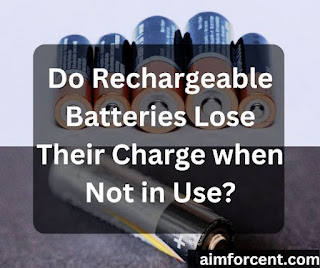Do Rechargeable Batteries Lose Their Charge when Not in Use?
Rechargeable batteries are a popular alternative to disposable batteries because of their cost savings and environmental benefits. However, one common question that users have is whether rechargeable batteries lose their charge when not in use. Generally, rechargeable batteries have a longer lifespan than regular batteries because of the multiple recharge cycle, but rechargeable batteries lose their charge more quickly than disposable batteries. I think it is a very relevant question to tell you about the self-discharge rate of rechargeable batteries. Please read this post, and you will find the answer.
Know the Concept of Self-discharge in Batteries
All batteries, whether they are disposable or rechargeable, will eventually lose their charge over time. It is known as self-discharge. There are many factors for such an issue, including battery chemistry, temperature, and age.
In a rechargeable battery, self-discharge occurs even when the battery is not in use, and its rate varies depending on the type of battery.
Self-discharge Rate of Rechargeable Batteries
Generally, a rechargeable battery has a higher self-discharge rate than a disposable battery because of the chemistry and ingredients of the battery, which causes it to lose energy over time. The self-discharge rate of a rechargeable battery varies depending on the type of battery chemistry.
For example, nickel-metal hydride (NiMH) batteries can lose up to 30% of their charge per month, while lithium-ion (Li-ion) batteries can lose up to 10%.
Factors that Influence the Self-discharge Rate of Rechargeable Batteries
You should rely on regular batteries if you want a lower self-discharge rate. When not in use, regular batteries lose less energy than rechargeable batteries. Some of the well-known factors that influence the self-discharge rate are:
Effect of Temperature on Batteries
Do you know temperature plays a significant role in the self-discharge rate of rechargeable batteries? High temperatures accelerate the self-discharge rate, while low temperatures slow it down. For example, storing batteries in a hot car or direct sunlight causes them to lose their charge more quickly than storing them in a cool, dry place. That is why you often find manufacturer’s instructions suggesting to ‘keep it in a cool and dry place.’
Age of the Batteries
If you are using the batteries for a long time, you may find deterioration in performance. That means the batteries may not hold the charge as long as they did in the first few years. You will face the problem more with cheap local batteries. For example, have you ever changed smartphone batteries? A branded battery generally lasts for 4-7 years, but cheap quality non-branded batteries often discharge quickly and may not last more than one year.
How to Control the Self-discharge Rate in Rechargeable Batteries?
Now you have understood the self-discharge rate. Fortunately! There are several ways to decrease the rate of your rechargeable batteries. Indeed, I agree that self-discharge is a natural phenomenon, and you cannot prevent it completely, still read the following suggestions to control the discharge rate, enhancing the performance of your batteries.
Store Batteries in a Cool, Dry Place
As I have mentioned earlier, temperature significantly impacts the self-discharge rate of rechargeable batteries. Storing batteries in a cool, dry place is a great way to slow down the self-discharge rate and prolong the batteries’ lifespan.
Use the Batteries Regularly
Regular use of rechargeable batteries helps keep them charged and reduces the impact of self-discharge. For example, if you have rechargeable batteries for a digital camera, make sure to use the camera frequently to keep the batteries charged.
Use a Battery Charger with a Maintenance Mode
Interestingly, you have a DIY solution! Some battery chargers have a maintenance mode that keeps the battery charged even when it is not in use. It reduces the self-discharge rate and improves performance.
Charge the Battery before Storing It
Are you storing rechargeable batteries for a few months or more? It is a good idea to recharge the batteries before storing them. It slows down the self-discharge rate and ensures they are ready to use when needed.
I hope now you have a detailed idea about the self-discharge rate and why rechargeable batteries lose their charge when not in use. Please keep these suggestions in mind to prolong the lifespan of your rechargeable batteries and ensure that they are always ready to use when you need them.
Read More,
Risk of Using Rechargeable Batteries in Unsupported Devices
Meet Rohan, a writer who loves to inspire and motivate others. He’s all about those feel-good quotes that can light up your day! When he’s not crafting words of encouragement, Rohan dives into the world of the latest technologies, exploring what’s new and exciting. But that’s not all—his heart beats for solar products, the kind that harness the power of the sun for a greener future. And guess what? He’s a total pet lover too! When he’s not busy writing, you’ll find Rohan surrounded by his furry friends, spreading joy and cuddles all around. Follow Rohan on Twitter and Facebook






